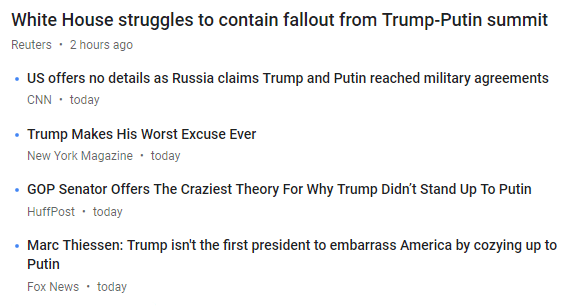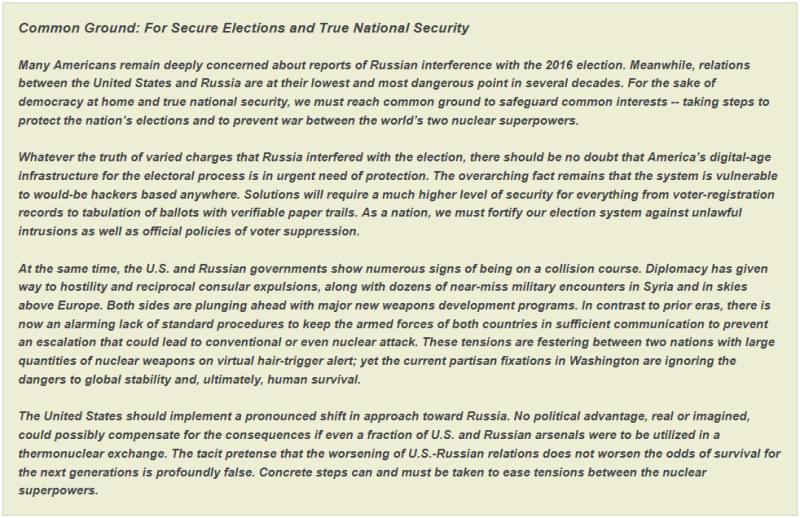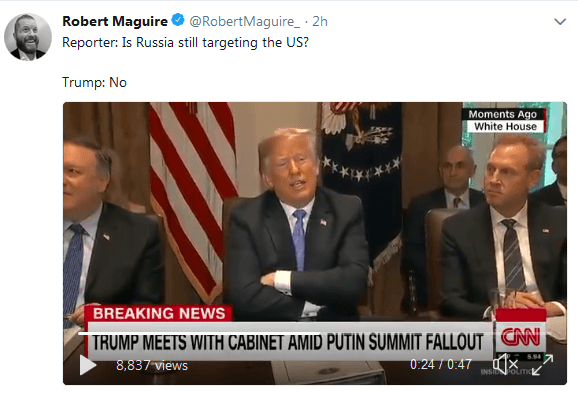Press reports of the Putin-Trump meeting in Helsinki converged quickly on a dominant narrative — Putin advanced Russian interests and the US president inexplicably supports (or doesn’t support) Putin’s interests. At Strategic Demands, as an independent voice distinct from news cycle narratives, we focus here on our interests, the ‘issue of issues’, nuclear weapons

Strategic Demands/GreenPolicy360
Time to take a closer look at nuclear arms control agreements. Three agreements between the US and Russia are in question, close to expiring, expired, or under review.
Lost in reporting of Trump’s statement and following day clarification of what he said and what he meant to say about Russian ‘meddling’/’cyber interference’ in the 2016 US election, is the question of a new nuclear arms race.
The question whether the START strategic agreement will be renewed and extended; the question about intermediate nuclear weapons and whether this lapsed agreement will be renegotiated; and the question of missile defense/offense systems ranging from anti-ballistic to anti-intermediate, from NATO forward basing to a new call for militarization of space in contravention to the current prohibition on weapons in space.
Although there is negligible news coverage on Russia-US nuclear issues following the Helsinki meeting, here are two reports:
Russia ready to extend New START, but has many questions for US — Putin
US offers no details as Russia claims Trump and Putin reached military agreements
- https://amp.cnn.com/cnn/2018/07/17/politics/trump-putin-russia-claim-military-agreements/index.html
As next generation nuclear weapons systems and dangers inherent in a renewed nuclear arms race are expanding, at this point we have little data on which to base optimism that arms control agreements from the past three decades can be renewed and/or extended.
Perhaps, in the private two-hour meeting between the two presidents, agreement were reached. On the nuclear arms front, we will watch for signs of Russian-US nuclear arms experts going to work on next decade nuclear agreements.
The next decade, the budgets and spending for nuclear arms and delivery systems, or limits and controls, will act to define what the world will be inheriting.
Allies are advocating a turn away from disastrous policies. The signers of the open letter here bring experience and knowledge.
Strategic Demands continues to put forward New Definitions of National Security.
Now is the time to re-define “true national security”.

July 2018 / An Open Letter
Common Ground: For Secure Elections and True National Security
Many Americans remain deeply concerned about reports of Russian interference with the 2016 election. Meanwhile, relations between the United States and Russia are at their lowest and most dangerous point in several decades. For the sake of democracy at home and true national security, we must reach common ground to safeguard common interests—taking steps to protect the nation’s elections and to prevent war between the world’s two nuclear superpowers.
Whatever the truth of varied charges that Russia interfered with the election, there should be no doubt that America’s digital-age infrastructure for the electoral process is in urgent need of protection. The overarching fact remains that the system is vulnerable to would-be hackers based anywhere. Solutions will require a much higher level of security for everything from voter-registration records to tabulation of ballots with verifiable paper trails. As a nation, we must fortify our election system against unlawful intrusions as well as official policies of voter suppression.
At the same time, the U.S. and Russian governments show numerous signs of being on a collision course. Diplomacy has given way to hostility and reciprocal consular expulsions, along with dozens of near-miss military encounters in Syria and in skies above Europe. Both sides are plunging ahead with major new weapons development programs. In contrast to prior eras, there is now an alarming lack of standard procedures to keep the armed forces of both countries in sufficient communication to prevent an escalation that could lead to conventional or even nuclear attack. These tensions are festering between two nations with large quantities of nuclear weapons on virtual hair-trigger alert; yet the current partisan fixations in Washington are ignoring the dangers to global stability and, ultimately, human survival.
The United States should implement a pronounced shift in approach toward Russia. No political advantage, real or imagined, could possibly compensate for the consequences if even a fraction of U.S. and Russian arsenals were to be utilized in a thermonuclear exchange. The tacit pretense that the worsening of U.S.-Russian relations does not worsen the odds of survival for the next generations is profoundly false. Concrete steps can and must be taken to ease tensions between the nuclear superpowers.
Signed:
Andrew Bacevich, Professor Emeritus, Boston University
Phyllis Bennis, Fellow, Institute for Policy Studies
Noam Chomsky, Professor, Author, and Activist
Stephen F. Cohen, Professor Emeritus of Russian Studies and Politics, NYU and Princeton University, and Board Member, American Committee for East-West Accord
John Dean, Former Nixon White House Counsel
Phil Donahue, Journalist and Talk-Show Pioneer
Thomas Drake, Former NSA Senior Executive and Whistle-blower
Daniel Ellsberg, Activist, “Pentagon Papers” Whistle-blower, and Author of The Doomsday Machine: Confessions of a Nuclear War Planner
Jack F. Matlock Jr., Former US Ambassador to the USSR and Board Member, American Committee for East-West Accord
Walter Mosley, Writer and Screenwriter
John Nichols, National Affairs Correspondent, The Nation
Viet Thanh Nguyen, Pulitzer Prize–Winning Novelist
Frances Fox Piven, Distinguished Professor Emeritus, CUNY Graduate School
Valerie Plame, Former Covert CIA Operations Officer and Author
Adolph Reed Jr., Professor of Political Science, University of Pennsylvania
Bill Richardson, Former Governor of New Mexico
Patricia Schroeder, Former Congresswoman
Norman Solomon, National Coordinator, RootsAction.org
Gloria Steinem, Writer and Feminist Organizer
Adlai Stevenson III, Former US Senator and Chairman, Adlai Stevenson Center on Democracy
Katrina vanden Heuvel, Editor and Publisher, The Nation
Alice Walker, Writer, Poet, and Activist
Jody Williams, Professor and Nobel Peace Prize Laureate
James Zogby, President, Arab American Institute
Additional signers



